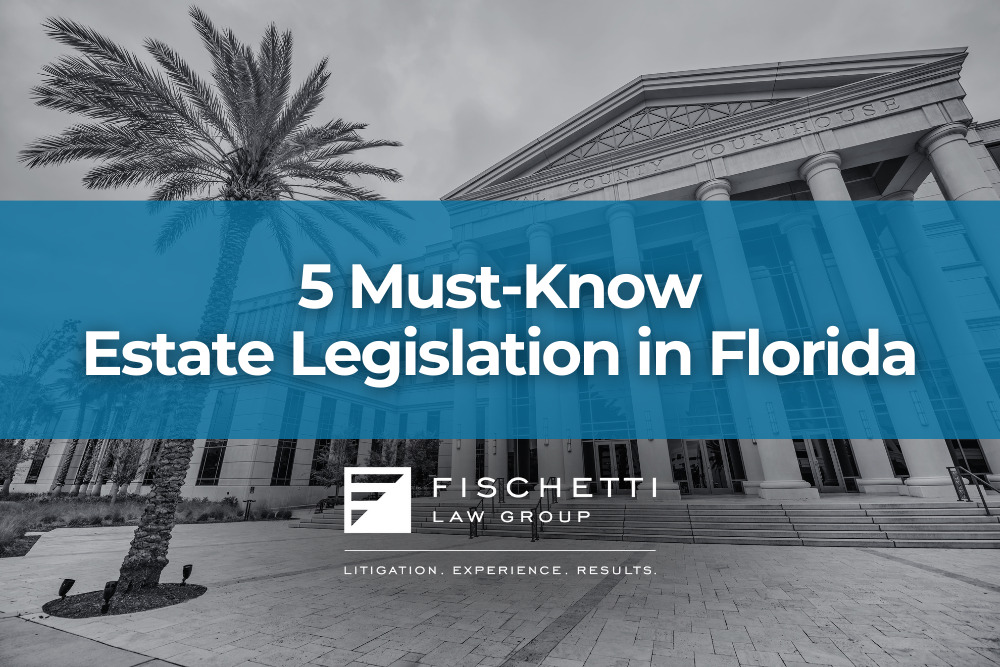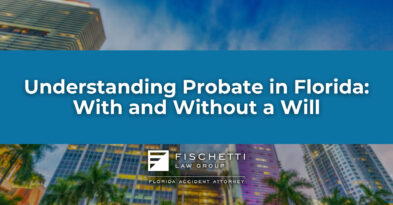5 Must-Know Laws in Florida Estate Planning
5 Must-Know Estate Planning Laws in Florida
If you’re getting your estate planning journey started in Florida, it’s important that you understand the legislation surrounding your estate plan. Understanding the legal landscape is crucial to ensuring that your wishes are properly executed, and your loved ones are protected in the future.
Each state has its own set of laws regarding certain elements of estate planning. When it comes to Florida estate, specific laws govern various aspects of estate planning, from wills and trusts to probate and guardianship. We want to discuss the top 5 most important laws in Florida related to estate planning, so that you’re able to make informed decisions and secure your legacy with confidence.
5 Must-Know Florida Estate Planning Laws
1. Florida Probate Code
2. Homestead Protection
3. Florida Elective Share
4. Florida Trust Code
5. Advance Directives
1. Florida Probate Code
The Florida Probate Code is a comprehensive set of laws that govern the process of administering a deceased person’s estate. These laws outline the procedures and requirements for handling the distribution of assets, payment of debts and taxes, appointment of personal representatives (executors), validation of wills, and resolution of disputes related to estates.
It provides the legal framework for probate proceedings in Florida and ensures that the deceased person’s assets are distributed according to their wishes or state law if no valid will exists.
Who does the Florida Probate Code apply to?
The Florida Probate Code applies to individuals who have passed away and whose estates are being administered in the state of Florida. It governs the probate process for Florida residents and individuals who own property in Florida at the time of death.
Additionally, the probate code may apply to out-of-state residents if they own property in Florida that is subject to probate proceedings. Overall, the Florida Probate Code sets forth the legal procedures and requirements for administering estates and distributing assets in the state of Florida.
2. Homestead Protection
One of the unique features of Florida’s estate planning laws is the Homestead Exemption, which provides significant protection for primary residences. Under Florida law, a homestead property is exempt from forced sale to satisfy most creditors’ claims, including those arising from medical bills and credit card debts.
Additionally, the homestead exemption offers valuable tax benefits, such as reductions in property taxes and the ability to transfer the homestead to surviving spouses or minor children.
Who does Homestead Protection apply to?
Homestead protection in Florida applies to individuals who own and reside in a primary residence in the state. The protection is intended to safeguard the primary residence from forced sale to satisfy most creditors’ claims.
This protection extends to homeowners who use their Florida property as their permanent residence, regardless of whether they own the property outright or have a mortgage on it.
Additionally, certain exemptions and benefits provided by homestead protection may also apply to surviving spouses and minor children of the homeowner. Overall, homestead protection is designed to preserve the family home and provide financial security for Florida residents.
3. Florida Elective Share
In Florida, spouses have certain rights to inherit from each other’s estates. Even if one spouse attempts to disinherit the other through a will or trust. The Florida Elective Share statute allows a surviving spouse to claim a portion of the deceased spouse’s estate, regardless of the terms of the estate plan.
This share typically amounts to 30% of the elective estate, which includes probate assets, certain non-probate assets, and property transferred during the marriage. Navigating the complexities of the Florida Elective Share law is essential for ensuring fair and equitable distribution of assets among spouses.
Who does the Florida Elective Share Statute apply to?
The Florida Elective share statute applies to surviving spouses whose deceased spouse passed away while living in their permanent residence in Florida. The purpose of the Florida Elective Share statute is to provide financial protection for surviving spouses and prevent them from being completely disinherited by their deceased spouse’s estate plan.
4. Florida Trust Code
Trusts are powerful estate planning tools that offer flexibility, privacy, and control over asset distribution. In Florida, trusts are governed by the Florida Trust Code, a comprehensive body of law that outlines the creation, administration, and termination of trusts.
Whether you’re establishing a revocable living trust for probate avoidance or creating a special needs trust to protect a disabled beneficiary, understanding the Florida Trust Code is essential for designing a tailored estate plan that meets your unique needs and goals.
Who does the Florida Trust Code apply to?
The Florida Trust Code applies to individuals who establish trusts or are beneficiaries of trusts governed by Florida law. This includes trust creators, trustees, beneficiaries, and other parties involved in the creation, administration, or termination of trusts.
5. Advance Directives
Advance directives are legal documents that allow individuals to specify their healthcare preferences and appoint someone to make medical decisions on their behalf if they become incapacitated.
In Florida, advance directives include a Living Will, which outlines your wishes regarding life-sustaining treatment, and a Designation of Health Care Surrogate, which appoints a trusted individual to make medical decisions for you.
Understanding Florida’s laws regarding advance healthcare directives empowers you to proactively plan for healthcare decisions and ensure your wishes are respected during times of incapacity.
Who do Advance Directives apply to?
Advance directives in Florida apply to individuals who want to plan for their future healthcare decisions and appoint someone to make medical decisions on their behalf if they become unable to do so.
Specifically, advance directives apply to adults who are of sound mind and capable of making their own healthcare decisions.
Understanding Florida’s Estate Planning Laws
In conclusion, understanding the Florida estate planning laws requires careful consideration of the various statutes and regulations that govern asset distribution, property protection, and healthcare decision-making.
By familiarizing yourself with the top 5 most important laws related to estate planning in Florida, you can take proactive steps to protect your assets, preserve your legacy, and provide for your loved ones’ future. Whether you’re drafting a will, establishing a trust, or executing advance directives, consulting with an experienced estate planning attorney can provide invaluable guidance and peace of mind as you plan for the road ahead.
Fischetti Law Group can help you understand how Florida estate planning laws may apply to you. Our estate planning attorneys will listen to your unique situation and provide you with the services that you need. Whether it be a power of attorney, will, trust, healthcare proxy, or other healthcare directives, our attorneys can do it all. Don’t hesitate to contact us and call 833-645-3247 with your estate planning questions.
TESTIMONIALS
What People Say
I had a complicated trust situation, but Cheyenne Pearson helped me figure it out. I will be coming back to them for my other estate planning needs!
I quickly needed a power of attorney and Cheyenne Pearson was able to create one for me within 24 hours. Thank you!!!











